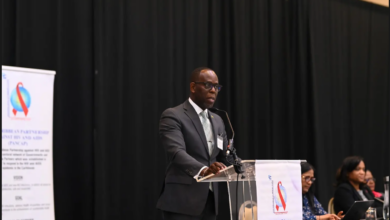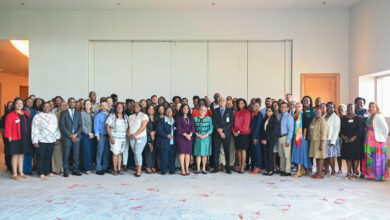Forum to maximise Learning, Coordination and Synergies among recipients of Global Fund Multi-Country Grants
The Pan-Caribbean Partnership against HIV and AIDS (PANCAP), the mechanism that provides a structured and unified approach to the Caribbean’s response to the HIV epidemic, will facilitate a “Joint Regional Dialogue among Key Stakeholders and Partners” of the Global Fund to Fight AIDS, Tuberculosis and Malaria (GFATM) multi-country grant in Port-of-Spain, Republic of Trinidad and Tobago, 13 – 15 September 2022.
The Dialogue is a result of a collaboration with the Global Fund, the Latin America and the Caribbean (LAC) platform and the consortium of Sub-Recipients consisting of the Pan Caribbean Partnership against HIV and AIDS (PANCAP), the Caribbean Vulnerable Communities Coalition (CVC) and the Centro de Orientación e Investigación Nacional (COIN) of the multi-country grant.
Over eighty (80) participants are expected to attend, including Caribbean Country Coordinating Mechanism (CCM) members, who represent communities affected by the three (3) diseases, as well as key and vulnerable populations (Belize, Cuba, Dominican Republic, Guyana, Haiti, Jamaica and Suriname), OECS Regional Coordinating Mechanism (RCM) members, Caribbean networks of key populations participating in the multi-country grant, National AIDS Programme (NAP) Managers, Civil Society Organisation (CSO) representatives implementing grant activities, technical assistance providers/agencies, International Development Partners including the Global Fund, USAID/PEPFAR, PAHO and UNAIDS.
According to Dr. Shellon Bovell, Project Coordinator, Global Fund (GF), CARICOM Secretariat, the Dialogue will maximise learning, coordination and synergies among recipients of the multi-country grant. She further explained that this would allow stakeholders to discuss priority issues, including the effective use of resources and added value for beneficiaries of the grant, while sustaining the gains in HIV programming.
Specifically, the Dialogue will seek to improve coordination and collaboration between the regional GF project, national GF grants, national programmes, civil society and communities in their responses to HIV, Tuberculosis (TB) and malaria through sharing experiences, strategies and best practices.
“We will also seek to identify challenges affecting the expansion of the response to HIV, TB and malaria in the Caribbean and to improve the understanding of the Global Fund processes by all stakeholders, including communities and beneficiary countries that will have a significant impact on our Region”, stated Dr. Bovell.
She further explained that national programmes and CSOs would share their experiences and lessons learned from involvement and engagement in Global Fund-related processes in the Caribbean.
The overarching objective is to foster more synergies among stakeholders of the multi-country grant to fulfil the vision of an AIDS-free Latin America and the Caribbean.
– ENDS –
Image caption: Dr. Shellon Bovell, Project Coordinator, Global Fund (GF), CARICOM Secretariat
Contact:
Timothy Austin
Senior Project Officer, Communications
PANCAP Coordinating Unit
CARICOM Secretariat
Turkeyen, Greater Georgetown, Guyana
Email: taustin.consultant@caricom.org
Tel: (592) 222-0001-75, Ext. 3409 | Visit www.PANCAP.org
EDITOR’S NOTES
The consortium of Sub-Recipients consisting of the Pan Caribbean Partnership against HIV and AIDS (PANCAP), the Caribbean Coalition of Vulnerable Communities (CVC) and the Centro de Orientación e Investigación Nacional (COIN), submitted a funding request to the Global Fund in August 2018 to provide sustainable prevention, treatment and care services for key populations in the Caribbean region. In response to this request, the Global Fund to Fight AIDS, Tuberculosis and Malaria (GFATM) approved a budget of US$6,500,000 for implementing a three-year Project (1 October 2019 – 30 September 2022).
The Global Fund to Fight AIDS, Tuberculosis and Malaria (GFATM) reaffirmed its commitment to strengthening the voices of communities and civil society in Global Fund processes, investing in a third phase of the Community Engagement Strategic Initiative (CE SI), former Community, Rights and Gender Strategic Initiative (CRG SI) for the period 2021-2023.
The primary objective of the CE SI is to strengthen the engagement of civil society and communities in the Global Fund and related national processes. Engagement of community and civil society actors at all stages in the grant life cycle is critical in designing, developing and implementing effective responses to the three diseases and systems strengthening, ensuring that Global Fund investments evolve as responsive to those most impacted.
The CE SI works through the following three components:
- Technical Assistance (TA) to support communities and civil society groups to engage in national processes linked to Global Fund investments.
- Long-term strengthening of HIV, TB and malaria organisations and networks and engagement funds for women and girls, and
- Regional Civil Society Platforms for Communication and Coordination.
HELPFUL LINKS:
Global AIDS Strategy 2021–2026, End Inequalities, End AIDS
https://pancap.org/pancap-documents/global-aids-strategy-2021-2026-end-inequalities-end-aids/
Caribbean Regional Strategic Framework on HIV and AIDS (CRSF) 2019-2025
https://pancap.org/pancap-documents/caribbean-regional-strategic-framework-2019-2025/
WHAT IS PANCAP?
PANCAP is a Caribbean regional partnership of governments, regional civil society organisations, regional institutions and organisations, bilateral and multilateral agencies and contributing donor partners which was established on 14 February 2001. PANCAP provides a structured and unified approach to the Caribbean’s response to the HIV epidemic, coordinates the response through the Caribbean Regional Strategic Framework on HIV and AIDS to maximise efficient use of resources and increase impact, mobilises resources and build capacity of partners.
What are the Global AIDS Strategy 2021–2026 targets and commitments?
If targets and commitments in the strategy are achieved:
- The number of people who newly acquire HIV will decrease from 1.7 million in 2019 to less than 370 000 by 2025
- The number of people dying from AIDS-related illnesses will decrease from 690 000 in 2019 to less than 250 000 in 2025.
- The goal of eliminating new HIV infections among children will see the number of new HIV infections drop from 150 000 in 2019 to less than 22 000 in 2025.






